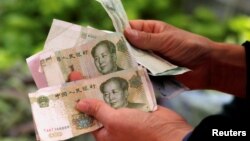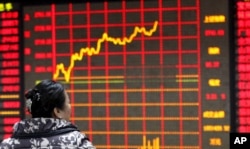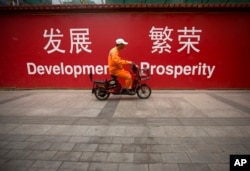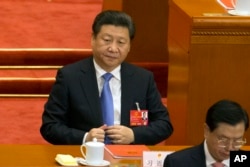As China’s economy continues to slow, powerful resistance is stalling efforts by Chinese leader Xi Jinping to push through much needed reforms, despite suggestions he is the country’s most powerful leader in decades.
And based on details about the economy revealed in a recent high-level interview in a top Communist Party newspaper, there is a risk that that defiance could develop into a full-blown struggle.
Authoritative person
Figuring out what is really going on with the Chinese economy or decision making in China has long been a challenge, but an unidentified “authoritative person’s” interview with the People’s Daily this month has given a rare peak beyond the veil.
In the interview, the “authoritative person” talks at length about the challenges China’s economy is facing, including a frank assessment that while tracking with “expectations,” growth will continue to be slower for more than two years.
The interview mentioned several times the problem of so-called “zombie enterprises” or inefficient and debt ridden state-owned enterprises. It also talked about how China must take on challenges such as overcapacity, bad loans and local government debt, or face even greater risks.
Some believe that President Xi or someone close to him gave the interview, and because of that, it was perhaps a shot across the bow [warning] aimed at China’s two key economic policy leaders, Premier Li Keqiang or perhaps Vice Premier Zhang Gaoli, for not doing enough.
It also could be a possible sign that Premier Li in particular might not survive an upcoming leadership reshuffle expected in late 2017.
But, others argue Zhang and Li have been raising the same concerns as well - and frequently - and could have been the source of the article.
SOEs in cross hairs
Jacob Kirkegaard, a senior fellow at the Peterson Institute for International Economics, said what seems clear from the interview is that the real opponent is state-owned enterprises (SOEs) and their backers, not the premier.
“Their backers in the provinces, the railroad ministry, the traditional very investment oriented agencies that would like to continue things the way they are,” Kirkegaard said.
Francesco Sisci, a Beijing-based China commentator said that while one cannot rule out that Li or those in charge of economic affairs might be the target of the interview, the piece really seems to be aimed more at those who are resisting economic reform and state-owned enterprises.
But determining who is fighting against whom is a difficult to say. And the reform of state-owned enterprises is not just one group against another, he said.
“It is a massive group of interests, pervasive, which have built interests and clout and power and they are supported by trillions of dollars,” he said.
What is clear from the interview is that warning shots are being fired (warnings are being made) and threats are being issued, but all-out war (major disagreement) has not broken out, just yet. But, he adds, it could.
“This could spin into an all-out power struggle. Either these guys will yield or the leadership will have to yield to them or there will be power struggle,” Sisci said.
Reform agenda struggling
Since coming to power, Xi has been a strong advocate of reforming state-owned enterprises. It has been a key policy agenda of his leadership. And during recent political meetings in March, the government vowed to cut overcapacity in the coming years and that millions of layoffs were on the horizon. But so far, there has been little news of more pending layoffs.
More recently, there have been concerns that some state-owned enterprises, which were previously shut down, have begun to open up again. During the first three months of the year, China saw a massive surge in credit that many analysts have attributed to continuing support to state-owned enterprises.
And this has led some to wonder whether Xi can really pull it off (succeed).
“He (Xi) may be the most powerful individual, president in China’s recent history. But clearly he doesn't seem to have the actual power to push through what he wants to do, at least not to date,” said Kirkegaard.
And yet calls to move forward continue.
On Friday, China’s official Xinhua news agency reported that during a meeting of the Central Leading Group for Comprehensively Deepening Reform, a body that Xi chairs, he urged China to seize its window of opportunity and push forward with reforms.
Xi said that while reforms might bring short-term pains, not pushing ahead with them now could mean more pain in the long run.







